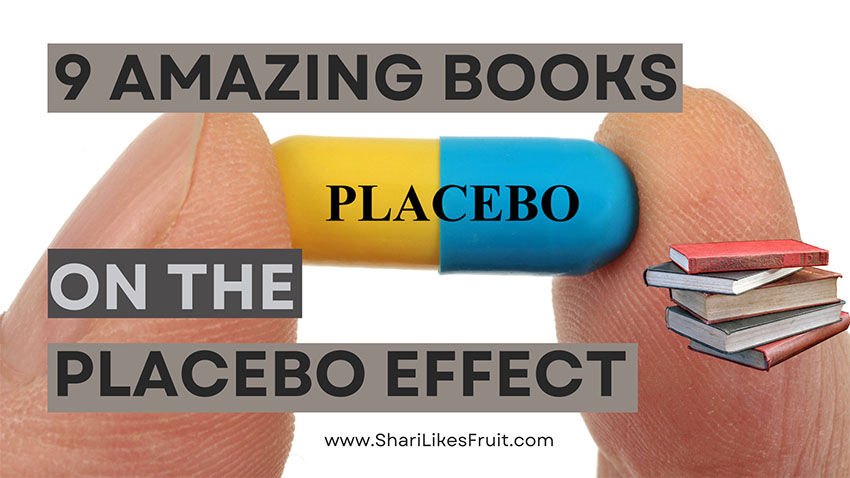What is the Placebo Effect?
“A beneficial effect produced by a placebo drug or treatment, which cannot be attributed to the properties of the placebo itself, and must therefore be due to the patient’s belief in that treatment.” – Dictionary.com
The placebo effect books below show how your brain can make your body believe that a pseudo-treatment is real, which then stimulates the healing process.
After many experiments documented in these books and other research, it has become clear that the placebo effect shows the power of our mindset for healing – and not necessarily a given medical treatment or medication.
Top 9 Books on the Placebo Effect
Here are the best placebo effect books we’ve read and loved – that inspired us to dig deeper into what’s possible.
These books eliminate the need for excuses.
They empower us to dream bigger, manifest more, heal ourselves spiritually and physically, and know that we are the creator of better lives.
(1) The Biology of Belief by Bruce Lipton, Ph.D. (2010)
This is an oldie but a goodie because Dr. Lipton always reminds us of what’s possible. He helps us realize that our life’s limitations are largely self-imposed.
I love that I’ve been seeing old clips of him on YouTube and TikTok being recycled. It’s because we need to be reminded of the power of our minds and use the power of our consciousness to create miracles in our lives.
“This book will forever change how you think about your own thinking. Stunning new scientific discoveries about the biochemical effects of the brain’s functioning show that all the cells of your body are affected by your thoughts. The author, a renowned cell biologist, describes the precise molecular pathways through which this occurs.”
In addition to his detailed discussion of the placebo effect and why/how it can be so powerful, he also discusses the “nocebo” effect, which clearly illustrates the power of our negative beliefs in self-healing.
“If positive thinking can pull you out of a depression and heal a damaged knee, consider what negative thinking can do in your life. When the mind, through positive suggestion, improves health, it is referred to as the placebo effect. Conversely, when the same mind is engaged in negative suggestions that can damage health, the negative effects are referred to as the nocebo effect.”
(2) You Are the Placebo by Dr. Joe Dispenza (2014)
You Are The Placebo is the placebo effect book that most people know about.
Dr. Dispenza gained widespread attention after his appearance in the movie, What the BLEEP Do We Know!? (2004) and offers a guided healing meditation near the end of this book.
“Is it possible to heal by thought alone – without drugs or surgery? The truth is that it happens more often than you might expect… Dr. Joe Dispenza shares… documented cases of those who reversed cancer, heart disease, depression, crippling arthritis, and even the tremors of Parkinson’s disease by believing in a placebo.”
Dr. Joe Dispenza
You Are the Placebo is one of our favorites because of the practical knowledge it provides for your own life – it offers a way to manipulate your own mind in a beneficial way – so you can heal.
(3) Placebo Effects: Understanding the Mechanisms in Health and Disease (3rd Edition) by Fabrizio Benedetti (2021)
This one’s a textbook for those scholarly types who like to see scientific studies.
“We know that this is an active psychobiological phenomenon which takes place in the patient’s brain and that is capable of influencing both the course of a disease and the response to a therapy.”
Fabrizio Benedetti
(4) Suggestible You: The Curious Science of Your Brain’s Ability to Deceive, Transform, and Heal by Erik Vance (2016)
“This riveting narrative explores the world of placebos, hypnosis, false memories, and neurology to reveal the groundbreaking science of our suggestible minds. Could the secrets to personal health lie within our own brains? Journalist Erik Vance explores the surprising ways our expectations and beliefs influence our bodily responses to pain, disease, and everyday events.”
Amazon.com
Erik Vance explores how our brain’s powerful capacity for suggestion can shape our experiences, influence treatment outcomes, and ultimately reshape our understanding of the mind-body connection.
(5) The Nocebo Effect: Overdiagnosis and Its Costs by Stewart Justman (2015)
The Nocebo Effect, as mentioned below, shows the alarming consequences of turning everyday issues into medical conditions.
This book explores how the nocebo effect can inadvertently cause individuals labeled as ill to embody their diagnosis, exposing the power of perception.
(6) The Placebo Effect: An Interdisciplinary Exploration by Anne Harrington
In this incredible book, Harrington provides a comprehensive examination of the placebo effect from various disciplines.
She explores the historical, cultural, and scientific aspects of placebos, shedding light on their significance in medicine and the broader context of human perception and healing.
She invites readers to question the nature of belief, the power of the mind, and the complexities of medical treatments.
(7) Placebo: Mind over Matter in Modern Medicine by Dylan Evans
This one doesn’t have all 5-star reviews, but it’s a solid book for those wanting to understand the role of the placebo effect in medicine.
Evans covers the scientific reasons behind our body’s natural healing mechanisms – and how they can be triggered in a non-chemical way.
He explains potential reasons why the placebo effect works, including how evolution plays a role.
He even covers the ethical implications for practitioners who would have to “deceive” a patient in order to use it. Very thorough exploration.
(8) Mind Over Medicine: Scientific Proof That You Can Heal Yourself by Lissa Rankin
This classic has been revised and updated with up-to-the-minute scientific and spiritual insight.
Lissa Rankin teaches readers “how to listen to their bodies and assess all areas of their lives – relational, psychological, creative, environmental, and professional – to understand what they need for health.”
When Mind Over Medicine was first published, it broke new ground in the fertile region where science and spirituality intersect.Through the process of restoring her own health, Dr. Lissa Rankin discovered that the conventional health care she had been taught to practice was missing something crucial: a recognition of the body’s innate ability to self-repair and an appreciation for how we can control these self-healing mechanisms with the power of our own consciousness.
To better understand this phenomenon, she explored peer-reviewed medical literature and found evidence that the medical establishment had been proving that the body can heal itself for over 50 years.
She shared her findings and laid out a practical plan for readers to heal themselves in this profoundly wise book–a New York Times bestseller and now a classic guide for people who are on a healing journey from illness, injury, or trauma.
Amazon
(9) The Code of the Extraordinary Mind by Vishen Lakhiani
“If the mind is so powerful that it can actually change health based on a changed perspective, imagine what that could mean about the mind’s power to control our mood, our self-confidence, our happiness, and everything else that determines the quality of our time here on Earth.”
Vishen reiterates, “Our beliefs about our bodies seem to have an uncanny impact on how we experience our bodies – for good or bad.”
We definitely recommend checking out Vishen’s work!
Vishen has an encouraging approach to personal growth and fulfillment.
He challenges conventional wisdom and offers a new framework for living an extraordinary life by questioning inherited beliefs, fostering self-awareness, and unlocking one’s true potential through the power of consciousness engineering.
Since we know the placebo effect is real, then you also know your mind can be a powerful healing tool as part of your overall strategy against illness.
Disclaimer: It is not a replacement for professional medical doctors.
Placebo Bonus for Insomniacs
A study recently released shows you how the placebo effect can determine how long it takes you to fall asleep, how long you stay asleep, and the quality of your sleep.
In other words, what you believe about your sleep can help regulate your sleep!
Here is the sleep placebo study for those who want to gain restorative sleep for brain health and mental well-being.
Can the Placebo Effect Really Work on You?
It plays a role in all our lives. It can work for you or against you, depending on your awareness. It’s completely fascinating.
If You Forget You Have an Ailment, Does it Still Exist?
When I was working in the family business, I watched my stepdad suffer from really bad neck pain. Every time he’d go into his office to work, the pain got worse. He tried every modality for healing, and nothing worked.
Eventually, he was diagnosed with Alzheimer’s and gradually stopped going into his office. And you’ll never guess what happened – his neck pain was completely gone!
He was very verbal and communicated his every thought, pain, and need, but neck pain was never again mentioned.
Was it because he forgot that he had a neck issue?
And get THIS! He was also an alcoholic. So he hadn’t had a drop of alcohol in over 30 years – the entire time I grew up with him.
He always reaffirmed why he didn’t drink whenever it was offered at a party.
He felt he couldn’t even have a sip, or else he could potentially relapse.
I’ll bet you can guess what happened. Once his Alzheimer’s was in full swing and his memory was fading, he forgot completely that he ever identified with being an alcoholic.
In the years to follow, as his memory deteriorated, I saw him have a sip of wine with my mom. Zero problems! Why? Because he didn’t remember or know that he ever identified as an alcoholic.
Of course, I’m not saying this is the case for everyone. But it’s definitely an interesting anecdote about the power of our minds and perceptions as it relates to change.
While it’s not directly known as the Placebo Effect, it does show how our mind affects our body.
When his mind was no longer associated with neck pain as part of his identity, his neck pain vanished!
When his mind was no longer associated with being an alcoholic, he could have a drink and never relapse.
What is the Nocebo Effect?
The “nocebo” effect works like the placebo effect but with negative beliefs. So if a doctor tells you you have cancer and you have two months to live, you can actually manifest the symptoms of cancer and die just from believing what you were told!
In the Discovery Health Channel’s 2003 program called “Placebo: Mind Over Medicine,” a shoe salesman was told he had a fatal case of esophageal cancer, and he died a few weeks after his diagnosis.
We later find out from an autopsy that he had a tiny amount of cancer in his body (not enough to kill him) – and NO trace of esophageal cancer, which was the fatal diagnosis he originally heard from the doctor!
There is no doubt that both our positive and negative beliefs impact our health.
Weird Examples of the Placebo Effect
One of the more famous stories of the placebo effect involved different sets of patients suffering from debilitating knee pain.
They were divided into separate groups, with one of the groups receiving a “fake” surgery. The patients were sedated and received incisions but never any actual knee repair. It turns out they recovered at exactly the same rate as those that received the knee surgery!
You can read more about this in the book “The Biology of Belief” (page 139) mentioned above.
And in “The Code of the Extraordinary Mind,” you can read about a weight loss study done on a cleaning staff at a hotel.
When asked, these maids didn’t feel they were doing any exercise in their free time and weren’t losing weight.
But the researchers took half of the cleaning crew and implanted a new model of reality in their brains.
They informed half of the research participants that their daily cleaning duties met the CDC’s activity guidelines and surpassed the Surgeon General’s guidelines for exercise.
They also gave them a calorie count for all the various cleaning activities they were doing.
After a month of shifting their belief systems about their exercise, this group lost two pounds, lowered their blood pressure, and had healthier body fat and BMIs!
There are countless weird examples of the placebo effect done in studies, many of which are outlined in some of the books above.
What Seth Godin Says About the Placebo Effect
I loved reading what author Seth Godin shared about the placebo effect in a recent blog post:
If a placebo heals your illness, does that mean it was all in your head in the first place? That you weren’t really sick, or didn’t really want to get better?
If expensive wine tastes better to you, but you can’t tell wine apart in a double-blind taste test, does that mean it doesn’t really taste better to you, or that you have shallow tastes?
Can luxury goods, spiritual practices or a change in the weather change our situation?
Knee surgery works for some people, and those people, apparently, had an actual injury and the surgery fixed it. And yet, sham knee surgery (in which the patient is sedated, cut and stitched, but no internal changes occur) is just as effective as ‘actual’ knee surgery for certain physical ailments. Does that mean that those ailments weren’t real, or that the patient was not trying hard enough to get well?
Along the way, we’ve persuaded ourselves and others that our brains don’t matter so much, and that the stories in our lives are not nearly as important as the molecules.
And yet, every time we look closely, the opposite appears to be true.
Stories are a balm. And our brains are powerful, though not always (or even often) under our conscious control.
“It’s all in your head.” Where else would it be?
You can read Seth’s blog here.
What to Keep in (Your Powerful) Mind
Knowing there is scientific research to back up the power of the placebo effect, we can move beyond the “new age” hang-ups. We KNOW there is real healing power in our thoughts, actions, words, and beliefs.
The suggested books will help you dive deeper into “how” to implement the powers of the placebo effect in your own life.
Once you realize and firmly believe that something is possible, the hardest part is already done. What are you ready to manifest in your own life? Let’s go do it. I believe in you.

















